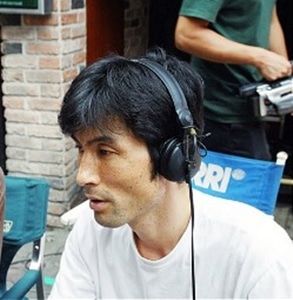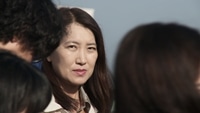Without Father
2012
Special invitation 2
KIM Eungsu | 2012 | Documentary | Color | HD | 80min
SYNOPSIS
This film follows two different journeys: Yoko’s is from Korea’s northernmost city, Nanam, through Seoul, Busan, the straits of Korea, to Hukuoka, Hiroshima, Kyoto and finally to Japan’s northernmost Aomori, set in 1945. The second is Yamashida Mashako’s journey: from Chungju in central Korea, through Daejeon, Busan, the straits of Korea, Hukuoka, Nagasaki, and then to Japan’s most southerly city, Koto, set in 2010. The two journeys go in two very different directions when they reach Hukuoka: Yoko heads towards central areas of Japan; Hiroshima, Kyoto and Tokyo. Masako’s journey takes her towards the southern tip of Japan through one of the outlying areas, Kyushu. The two Japanese women lived in Korea with their own reasons. They visit to their homeland in order to search for their respective biological fathers. The Korean narrator follows their journeys and raises questions about his own father. As a result, perhaps there is also a third journey explored in the film.
DIRECTING INTENTION
If the protagonist, Masako was a sad person, I wouldn't have travelled to Japan with her. I wanted to heal the sorrow between us through her cheerful attitude. Our journey was full of joy and we got much closer during filming. However, there was still a gap between us because of our nationalities. I concentrated on the view of ourselves which we try to perceive through the eyes of the other side. I did not want to focus on the issues which have been dealt with in both countries many times. But, this does not mean it is just empty rhetoric, a so-called, “balanced view.” I told her, “I don't want to ignore the fact that Japan invaded Korea but I don't want to protect the Koreans who resigned themselves to Japan's invasion either,” and we didn't forget what I had said. I respected her and she cared about us too. We had an opportunity for self-reflection during the shooting: we shared the common suffering, sorrow, and friendship as human beings. But we couldn't go far beyond the monster called “the nation.” The two countries have been hostile to each other on the surface, and this attitude has ruled their people. On the other hand they have also held secret communication with each other: look at what the Korean and the Japanese governments have done! There have undoubtedly been covert agreements between the two countries but if we don’t make friends with each other as individuals beyond the nations, and if we don’t create the mood of peace at the civilian level, it will turn into a hostile situation where our nations would once again force us to kill each other. The most important point is that this film has a strong objection to the concept of “orientalism” as defined from the Western perspective. In addition to this, the film is highlights a pioneering approach to life instead of a critical one. If you can see the world with an open mind, then you will see precious friends, akin to real gems.
FESTIVAL & AWARDS
2012 제13회 전주국제영화제 관객평론가상
DIRECTOR

KIM Eungsu
Time Lasts (1996)
Desire (2002)
Way to Go, Rose (2006)
Heavenly Path (2007)
The Past Is a Strange Country (2008)
The Origin of Water (2010)
STAFF
Director KIM Eungsu
Producer KIM Eungsu
Screenwriter KIM Eungsu
Cinematography BAK Ki-ung
Editor KIM Eungsu
Music KIM Won
Cast YAMASHIDA Masako
PROGRAM NOTE
<아버지 없는 삶>은 일종의 시네 에세이이다. 집안의 반대를 무릅쓰고 한국인과 결혼해 충주에 살고 있는 야마시다 마사코라는 50세의 일본 여성이 20년 만에 고향의 아버지를 찾아가는 과정을 따라가는 이야기의 뼈대는 매우 느슨하게 전개된다. 영화 전반에 걸쳐 쉼 없이 들려오는 감독의 내레이션은 1인칭 화자의 시점과, Q라는 인물이 B라는 또 다른 인물에게 보내는 서신 형식을 오간다. 내레이션 속에서 마사코의 여행에 대한 화자의 단상은 일제 해방기 북한에서 일본으로 도피했던 한 일본 여성의 수기인 <요코 이야기>와 오즈 야스지로의 <만춘>(1949)과 교호한다. 픽션과 논픽션, 현실과 이야기 속의 세 여성들이 가지고 있는 공통점은 아버지와의 특별한 관계 정도이다. 김응수 감독은 시공간을 비월하여 정신 혹은 육체적으로 아버지로부터 독립한 여성 마사코를 축으로, 아버지를 두고 시집을 가는 <만춘>의 노리코가 품은 연민, 아버지의 부재로 생과 사를 넘나드는 고통을 겪는 요코의 이야기를 대비시킨다.이 영화에서 아버지의 존재는 혈연적 관계를 초월한 거대한 제도의 상징이며, 애증의 기호이다. 한국인과의 결혼을 반대하고 끝내 딸을 부정해 버린 아버지를 마사코는 단호히 떠났고, 그녀의 아들이 가문의 대를 이을 수 있으리라는 사실을 깨달은 아버지의 화해의 제스처는 마사코의 마음을 움직이지 못한다. 마사코는 고향 고토를 20년 만에 방문하지만, 아버지와 조우하는 장면은 등장하지 않는다. 그녀는 시종일관 무표정한 얼굴로 여정을 이어가고, 감독은 그녀에게서 감정적 흔들림을 포착하려 하지만 이는 매번 실패로 돌아간다. 가부장적 전통에 얽매여 있는 마사코의 아버지는 감독의 내레이션 속에서 정치적 상징 질서 속의 아버지 박정희로, 요코의 시선 아래 미화되었지만 기실 731부대원 출신으로 추정되는 요코의 아버지로 이어진다. <아버지 없는 삶>은 아버지에 얽매인 삶으로 대변되는 해묵은 가부장적 가치관에 대한 사색적인 비판이며, 그 모든 고통에도 불구하고 획득해야 하는 ‘아버지 없는 삶’의 가치에 대해 역설한다.
장병원/영화평론가
